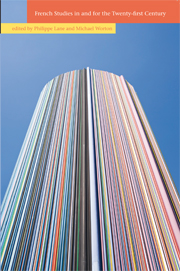Book contents
- Frontmatter
- Contents
- Notes on Contributors
- Foreword by Baroness Jean Coussins
- Foreword by His Excellency Bernard Emié
- Part I Contextualisations
- Part II Research and Public Engagement Strategies
- Part III The Place of Women and Gender in French Studies
- Part IV The Place of Literature
- Part V The Place of Linguistics in French Studies Today
- Part VI Theatre, Cinema and Popular Culture
- Part VII Area Studies, Postcolonial Studies and War and Culture Studies
- Part VIII Adventures in Language Teaching
- Appendices. Addresses to the Future of French Studies Conference
- Index
Foreword by Baroness Jean Coussins
- Frontmatter
- Contents
- Notes on Contributors
- Foreword by Baroness Jean Coussins
- Foreword by His Excellency Bernard Emié
- Part I Contextualisations
- Part II Research and Public Engagement Strategies
- Part III The Place of Women and Gender in French Studies
- Part IV The Place of Literature
- Part V The Place of Linguistics in French Studies Today
- Part VI Theatre, Cinema and Popular Culture
- Part VII Area Studies, Postcolonial Studies and War and Culture Studies
- Part VIII Adventures in Language Teaching
- Appendices. Addresses to the Future of French Studies Conference
- Index
Summary
At the time of writing, a review of the national curriculum in England and Wales is imminent. As far as languages are concerned, this will be a crucial opportunity to reverse some of the disastrous consequences of previous policies and to introduce new ones, which positively promote both the importance and the pleasure of learning modern foreign languages.
It is self-evident that the place of languages in schools will have a critical impact on their presence in higher education (HE), but the opposite is also true. University modern language departments should be much more closely attuned to the ways in which they can influence what goes on in schools. For example, if more universities had a language requirement for matriculation, schools would have to take account of this when advising pupils on their GCSE option choices and ensure that the timetable allowed sufficient time for languages. Currently, according to an OECD survey published in September 2010, secondary school pupils in the UK spend less time studying languages than anywhere else in the developed world. Only 7 per cent of the lesson time of 12 to 14-year-olds is allocated to languages, which is half the amount of time spent on sciences. This puts England joint bottom of a table of 39 countries, alongside Ireland and Estonia and behind Indonesia and Mexico. Unless schools produce sufficient numbers of prospective HE students who are qualified and motivated to take modern language degrees, cutbacks will inevitably follow in universities.
- Type
- Chapter
- Information
- French Studies in and for the 21st Century , pp. xix - xxPublisher: Liverpool University PressPrint publication year: 2011
- 1
- Cited by



